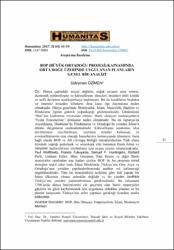| dc.contributor.author | Özmen, Süleyman | |
| dc.date.accessioned | 2018-07-25T08:52:12Z | |
| dc.date.available | 2018-07-25T08:52:12Z | |
| dc.date.issued | 2017 | |
| dc.identifier.uri | https://hdl.handle.net/20.500.11776/2889 | |
| dc.description.abstract | Dünya çapındaki sosyal değişim, soğuk savaşın sona ermesi, ekonomik modernleşme ve küreselleşme süreçleri, insanları milli kimlik ve milli devletten uzaklaştırmaya başlamıştır. Bu da kendilerini boşlukta ve önemsiz hisseden kitlelerin dine karşı ilgi duymasına neden olmaktadır. Dünya genelinde Hristiyanlık, İslam, Musevilik, Budizm ve Hinduizme ilginin giderek yoğunlaştığı gözlenmektedir. Günümüzde “Batı”nın kudretinin zirvesinde olması, Batılı olmayan medeniyetlerin “Ecdat Fenomenine” dönüşüne neden olmaktadır. Bu da Japonya’da Asyalılaşma, Hindistan’da Hindulaşma ve Ortadoğu’da yeniden İslam’a dönme duygularını canlandırmaktadır. Küreselleşme sendromu, ulus devletlerinin zayıflatılması, sınırların ortadan kalkacağı ve evrenselleşmenin esas olacağı hususlarının kamuoyunda işlenmesi, buna bağlı olarak BOP ve AB (Avrupa Birliği) müzakerelerinin Türk ulusu üzerinde yaptığı psikolojik ve sosyolojik etki tamamen Ilımlı İslam ve misyoner faaliyetlerinin yürütülmesi için uygun ortamı oluşturmaktadır. Paul Wolfowitz, Francis Fukuyama, Samuel P. Huntington, Richard Perle, Graham Fuller, Marc Grosman, Paul Henze ve diğer Batılı stratejistler tarafından ana hatları çizilen BOP ile bu projenin temel desteğini teşkil eden Iımlı İslam Modelinde Türkiye’nin Orta Asya ve Ortadoğu’nun yeniden yapılandırılmasında anahtar rol üstleneceği öngörülmektedir. Tüm bu stratejistlerin tezlerine göre laik yapıda bir İslam ülkesinin olması mümkün değildir ve bu yüzden özellikle Türkiye’nin yeniden yapılandırılması gerekmektedir. Bu çalışmada 1700’lerde dünya hakimiyetini ele geçirmiş olan Batılı emperyalist güçlerin bu gücü kaybetmemek için uygulamış oldukları planları ve bu planlar karşısında Türkiye’nin neler yapması gerektiği konuları analiz edilecektir. | en_US |
| dc.description.abstract | Worldwide social change, the end of the cold war, the process of economic modernization and globalization have begun to distract people from national identity and the national state. This causes the masses to become interested in the religion without feeling themselves in the void and without insignificance. It is observed that Christianity, Islam, Judaism, Buddhism and Hinduism are increasingly concentrated all over the world. The fact that today is at the peak of the power of the “West” causes non-Western civilizations to turn into “Ecdat (ancestry) Phenomena”. This revitalizes the feelings of Asiaticization in Japan, Hinduization in India and returning to Islam in the Middle East. The psychological and sociological impact of the BOP and EU (European Union) negotiations on the Turkish nation constitutes a suitable environment for the conduct of moderate Islamic and missionary activities, as globalization syndrome, the weakening of nation states, the emergence of borders and the universalization of the world will be essential. BOP, which is outlined by Paul Wolfowitz, Francis Fukuyama, Samuel P. Huntington, Richard Perle, Graham Fuller, Marc Grosman, Paul Henze and other Western strategists, and Turkey’s Central Asia and the Middle East is expected to assume a key role in restructuring. According to the thesis of all these strategists, it is not possible to have an Islamic country in a secular structure and therefore, especially Turkey needs to be restructured. In this study will be analyzed the plans that Western imperialist powers have taken to overcome world power in the 1700s and what Turkey should do in response to these plans. | en_US |
| dc.language.iso | tur | en_US |
| dc.publisher | Namık Kemal Üniversitesi | en_US |
| dc.rights | info:eu-repo/semantics/openAccess | en_US |
| dc.subject | BOP | en_US |
| dc.subject | Western World | en_US |
| dc.subject | Imperialism, Islam | en_US |
| dc.subject | Civilization Center | en_US |
| dc.subject | BOP | en_US |
| dc.subject | Batı Dünyası | |
| dc.subject | Emperyalizm | |
| dc.subject | İslam | |
| dc.subject | Medeniyet Merkezi | |
| dc.title | Bop (Büyük Ortadoğu Projesi) Kapsamında Orta Doğu Üzerinde Uygulanan Planların Genel Bir Analizi | en_US |
| dc.title.alternative | General Analysıs Of The Plans Applıed On The Mıddle East Wıthın The Scope Of Bop (Great Mıddle East Project) | en_US |
| dc.type | article | en_US |
| dc.relation.ispartof | HUMANITAS - Uluslararası Sosyal Bilimler Dergisi | en_US |
| dc.department | Tekirdağ Namık Kemal Üniversitesi Dergileri | en_US |
| dc.authorid | 194045 | en_US |
| dc.identifier.volume | 5 | en_US |
| dc.identifier.issue | 10 | en_US |
| dc.identifier.startpage | 41 | en_US |
| dc.identifier.endpage | 59 | en_US |
| dc.relation.publicationcategory | Makale - Ulusal Hakemli Dergi - Başka Kurum Yazarı | en_US |



















